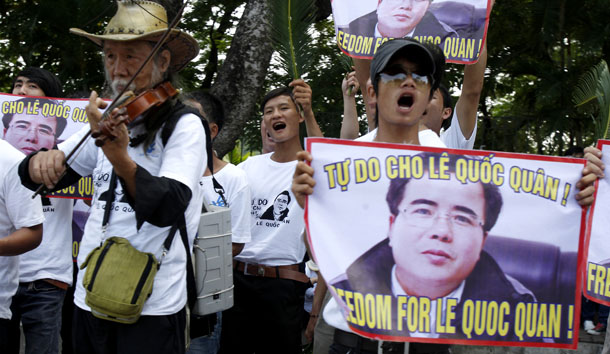HANOI — A Vietnam court jailed a prominent human rights activist for two and a half years on Wednesday after finding him guilty on tax evasion charges supporters say were aimed at muzzling critics of the Communist Party.
The US Embassy described the ruling against Le Quoc Quan as “disturbing” and called for all prisoners of conscience held in Vietnam to be freed.
The sentence comes at a critical time for Vietnam, which is locked in negotiations with Washington over a trade pact that could bring substantial benefits to the Southeast Asian country as it struggles to revive a once thriving economy.
Quan, 42, was arrested and detained several times after his return in 2007 from the United States, where he completed a six-month research fellowship about civil society and human rights, funded by Congress.
He was found to have avoided paying 437 million dong ($20,700) in tax, according to state-run media. He was also fined 1.2 billion dong.
Quan was arrested in December, nine days after he posted a blog critical of the country’s Parliament and a Constitution that enshrines the Communist Party of Vietnam’s leading role in the state.
The sentence is the latest in a slew of arrests and prison terms for Vietnamese who have spoken out against the government, despite free speech being guaranteed under the Constitution.
Most of the arrests have been bloggers or activists who post comments on the Internet, which is used by a third of Vietnam’s 90 million people.
In his final words before the verdict, Quan said the charges were trumped up and should be dropped, according to his lawyer, Ha Huy Son.
“I’m a victim of political acts,” Son quoted Quan as saying. “I am innocent.”
The verdict and sentence were announced under tight security, with nearby roads blocked off and no public access to the court. About 300 people held a rare demonstration on surrounding streets, some carried a banner that read “Freedom for Le Quoc Quan”.
“The use of tax laws by Vietnamese authorities to imprison government critics for peacefully expressing their political views is disturbing,” the US Embassy said in a statement.
“This conviction appears to be inconsistent with the right to freedom of expression.”
The ruling could further complicate Washington’s efforts to court a new political and military ally in China’s back yard and bring Vietnam into its Trans Pacific Partnership, a trade deal that requires congressional approval.
Experts say lawmakers need to be convinced Vietnam has improved its human rights record before they can endorse any bilateral pact.

















